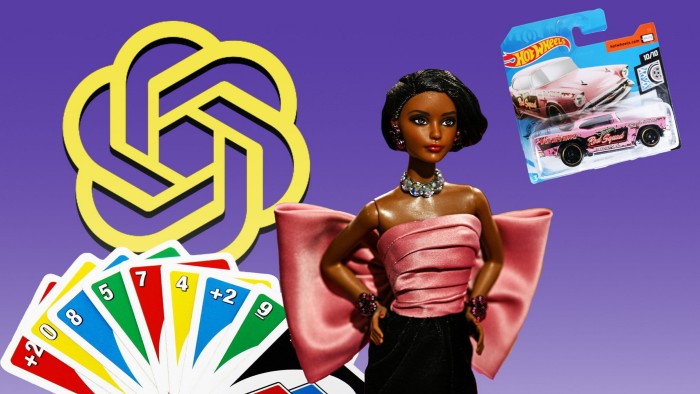Stay informed with free updates
Simply sign up to the Artificial intelligence myFT Digest — delivered directly to your inbox.
Mattel and OpenAI intend to make artificial intelligence part of children’s playtime with a partnership between the Barbie-maker and the tech group behind ChatGPT.
The two companies on Thursday said they had formed a “strategic collaboration” for Mattel, which also makes Hot Wheels and Uno card games, to use OpenAI’s technology to “bring the magic of AI to age-appropriate play experiences”.
The companies did not provide examples of how the tech could be married with Mattel’s toy line-up but said they would emphasise “safety, privacy, and security”.
The announcement underlines the rapid spread of AI across society, largely in the form of popular chatbots such as ChatGPT.
California-based Mattel, with $5.4bn in revenue, makes well-known toys and games under brands such as Fisher-Price and Thomas & Friends. But the company also licenses its intellectual property and produces entertainment associated with its brands, including the 2023 blockbuster Barbie movie.
Mattel is not licensing its intellectual property to OpenAI as part of the deal, a person familiar with the matter said.
“AI has the power to . . . broaden the reach of our brands in new and exciting ways,” said Josh Silverman, Mattel’s chief franchise officer. “Our work with OpenAI will enable us to leverage new technologies to solidify our leadership in innovation and reimagine new forms of play.”
Mattel will also enrol employees on OpenAI’s ChatGPT enterprise service.
The partnership comes as OpenAI also pushes into the devices market. It acquired former Apple design chief Jony Ive’s hardware start-up io for $6.4bn last month. At the time of the deal the ChatGPT maker said it planned to “create a family of products for the AGI era”, referring to artificial general intelligence, when AI cognition surpasses most humans.
OpenAI has not disclosed the form of its planned product but Ive, the designer behind a range of Apple products including the iPhone, has expressed regret over the adverse effects of smartphones.
“I think we have the opportunity here to kind of completely reimagine what it means to use a computer,” OpenAI co-founder Sam Altman previously said.
The start-up is not alone in seeking to commercialise generative AI by embedding it into devices. Amazon has started to roll out an enhanced version of its voice assistant Alexa, which is accessed through a range of speakers and displays, and utilises a host of AI models to respond to user queries.
The Seattle-based conglomerate this week said more than a million users have access to its so-called Alexa Plus assistant.
Mattel and OpenAI are likely to announce a first product later this year, which could be physical or digital in nature, said a person familiar with the matter. The companies declined to disclose the terms of the partnership.
The Toy Association, a US trade group, has said AI is becoming “increasingly common” in products offered by toy companies. A statement on its website said toy makers follow privacy laws such as the US Children’s Online Privacy Protection Act and the EU’s General Data Protection Regulation.
